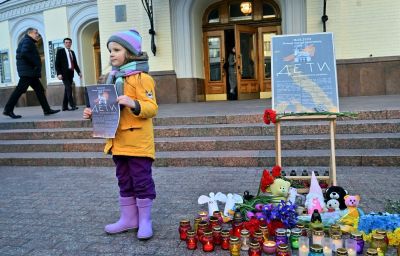Why is nobody talking about the nearly 20,000 abducted Ukrainian children?

Russia has abducted more than 19,546 Ukrainian children during its invasion of Ukraine. Some of those children have been forcibly adopted into Russia; others languish in a series of 43 camps spread across Russia and Russian-occupied territory. The majority of those camps are focused on “re-education,” military training, or both.
For us, these stories aren’t abstractions. In the course of shooting our upcoming documentary “A Faith Under Siege: Russia’s Hidden War on Ukraine’s Christians,” we’ve met these survivors and victims in person. We interviewed Rostyslav, a Ukrainian orphan boy that escaped from a Russian military camp, where he was kept in solitary confinement. We also met Nadiia, a mother who had a gun held to her head in front of her children while members of the Russian Guard tortured her husband in the next room. With a tip-off from her pastor, the family escaped from Russian-occupied Ukraine just days before her oldest child was set to be taken from them and sent to one of these Russian-controlled indoctrination facilities. Her story is here.
Wars rarely spare children, and Russia’s is no different. In the course of its full-scale invasion of Ukraine, Russia has so far killed 669 children and injured 1,854, with an average of 16 additional child casualties added to that tally every week. Child casualty rates have risen as the war drags on because Russia targets residential areas with missiles and Iranian "Shahed" drones, an effort that ramped up after President Donald Trump won the 2024 presidential election.
Casualties, including child casualties, occur during war. But the abduction of children is not common and indicates a zeal to destroy a people itself. Hamas, as part of their goal to destroy the State of Israel, abducted 30 children during their October 7, 2023 attack. The worldwide outrage that followed was visceral. The Sun put the faces of each child on their cover.
Sadly, the scope and scale of the abduction of Ukrainian children is so much worse, and, while the motivations may be similar, the international outcry has been muted. The Ukrainian government has identified 19,546 children who have been abducted. According to Russian authorities, if you include the number of Ukrainian children taken into Russia accompanied by their parents, that number swells to over 730,000. That’s up to 24,000 times more disastrous than what happened in Israel, while The Sun covered the story, it didn’t even make the front page.
Secretary of State Marco Rubio made it clear where America stands when it comes to abducted children in a March 15, 2025 speech to G7 leaders: “We’re sitting around as the world, sort of accepting that it’s normal and okay for you to go into a place, kidnap babies, kidnap teenagers, kidnap people who have nothing to do with any wars, that are not soldiers … it’s ridiculous, it’s sick, it’s disgusting.”
While Secretary Rubio was referring to Hamas’ abduction of Israeli children, the administration seems to have taken notice of Russia’s abduction of Ukrainian children. On March 19, the White House released a statement from President Trump’s phone call with Ukrainian President Volodymyr Zelenskyy. In it, Secretary Rubio and National Security Advisor Mike Waltz noted that President Trump “asked about the children who had gone missing from Ukraine during the war, including the ones that had been abducted. President Trump promised to work closely with both parties to help make sure those children were returned home.”
This follows a March 11 Joint Statement on the United States-Ukraine meeting in Saudi Arabia issued by the White House, where Ukraine agreed to a 30-day ceasefire if Russia also agreed to it. In that statement, “The delegations … discussed the importance of humanitarian relief efforts as part of the peace process, particularly during the above-mentioned ceasefire, including … the return of forcibly transferred Ukrainian children” (emphasis added).
As the Trump administration rightfully digs in on this issue, it is helpful to understand Russia’s motivations behind the abductions. There are a few theories on the subject, and they range from merely nefarious to blatantly genocidal.
According to Mykola Kubela, founder of Save Ukraine, an organization that has now rescued 612 children from the Russians, Russia is abducting Ukrainian children for two reasons. First, to destroy the Ukrainian identity of an entire generation, and, second, to turn these children into “patriotic Russians.” In doing so, Russia gains more cannon fodder for its current war against Ukraine, as well as future wars against the West. With Russia losing sometimes 2,000 soldiers per day, the motivation to create future troops makes sense. The U.S. State Department’s “Trafficking in Persons” report notes that Ukrainian boys are used for conscription, as well as “forced labor … including in forced criminality for drug trafficking and as couriers.” Ukrainian girls, meanwhile, are subject to “forced labor, forced conscription, and sexual exploitation in Russia-occupied areas, often via kidnapping, torture, and extortion.”
There is another strategic motivation to explain Putin’s hunger for abducted children: Russia’s acute demographic crisis. Russia’s birth rate has been declining for nearly 25 years, and Putin’s invasion of Ukraine has drastically exacerbated an overall “crisis of hopelessness.” In 2023, of the 1.8 million babies conceived in Russia, only 1.2 million were born, while over 460,000 were aborted. Falling birth rates and high abortion rates mean that Russia’s population could fall by 50% by 2100 – which happens to be the same century that the “World Russian People’s Council” (a joint venture of the Russian state and the Russian Orthodox Church) has called for a Russian population of 600 million.
That number cannot be realistically achieved without abducting children and the conquest of neighbors. Putin is keenly aware of his country’s failing demographics, and likely picked 2022 to invade because if he didn’t do so soon, he would lose the capacity to invade at all. Indeed, it appears that the abduction of Ukrainian children may not just be a feature of Putin’s war – it might be a primary motivation.
This is where the administration’s insistence on the return of Ukraine’s abducted children is so brilliant, as it creates a scenario where U.S. values can come to bear in a way that helps a favorable outcome in either of two possible outcomes.
First, if Putin truly desires peace, returning the abducted children would buy an immense amount of goodwill. It costs him nothing other than the minor administrative costs of return, and would clearly demonstrate his commitment to repairing relations with his neighbor and the world.
Alternatively, if Putin declines to return the children, it reveals his invasion of Ukraine was not just a territorial seizure, but also a desperate effort to bolster Russia’s declining population and a ruthless bid to erase Ukrainian identity. That kind of motivation does not lead to peace – it’s a motivation that only dies with defeat. If Putin refuses to return the children, he would clearly show the U.S. what his true goals are and give them the resolve and motivation to stop Russia with an increase in force.
President Ronald Reagan famously said “[a]n America that is militarily and economically strong is not enough. The world must see an America that is morally strong with a creed and a vision. This is what has led us to dare and achieve. For us, values count.”
This administration has made it clear that it, like America itself, values the return of the abducted children of our allies. Sticking to those values will result in the greatest possible number of children being returned, either immediately by Putin as a willing partner in peace, or over time as a clear global foe is brought to its knees by the strength of American values put into action.
Steven Moore is a former chief of staff in the U.S. House of Representatives who came to Ukraine on day five of the war and lives there now. He has testified in front of Congress about Russia's torture and murder of Ukraine's Christians. With more than 100 media appearances, Steven is a strong voice for Christians in Ukraine being oppressed by Vladimir Putin. His work has drawn Russia's attention, as the Kremlin has placed him on its hit list of foreign combatants.
Colby Barrett, JD, PE, is an entrepreneur, filmmaker, and former U.S. Marine Corps Captain who led infantry and scout/sniper platoons in the Pacific Rim and Middle East. His faith brought him to Ukraine in the fall of 2024 where he led a documentary film team on a 1,500-mile journey around the Ukrainian front, interviewing dozens of Christians who suffered under Russian occupation His film, A Faith Under Siege, premieres later this month.




























